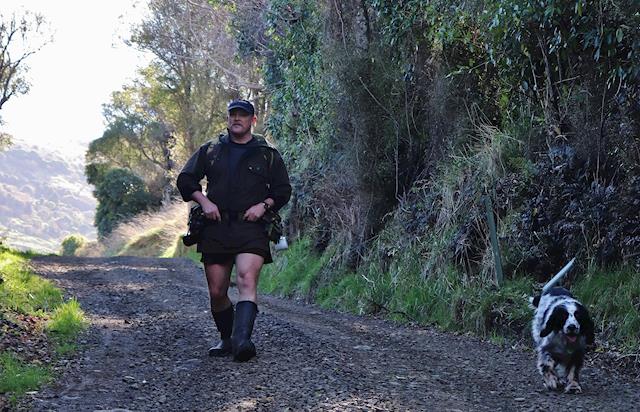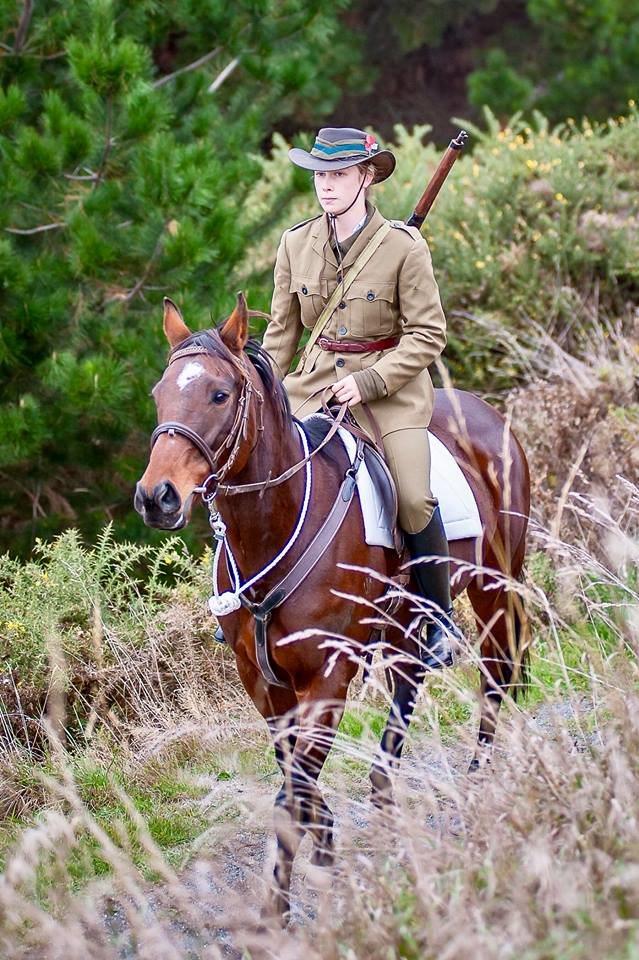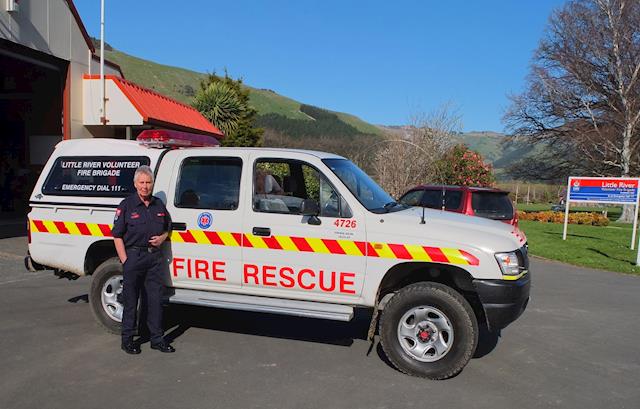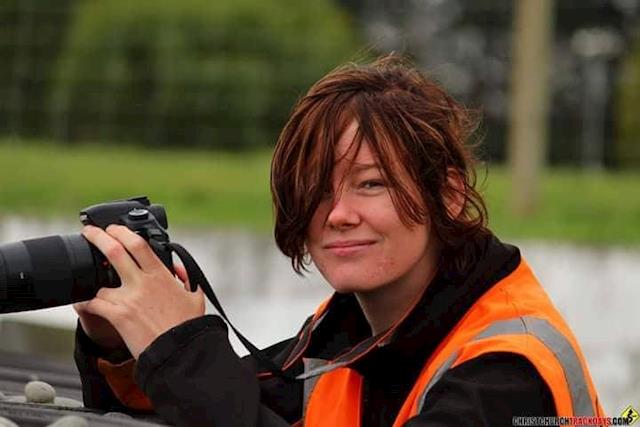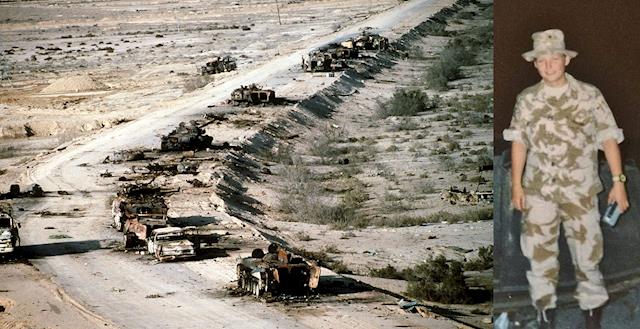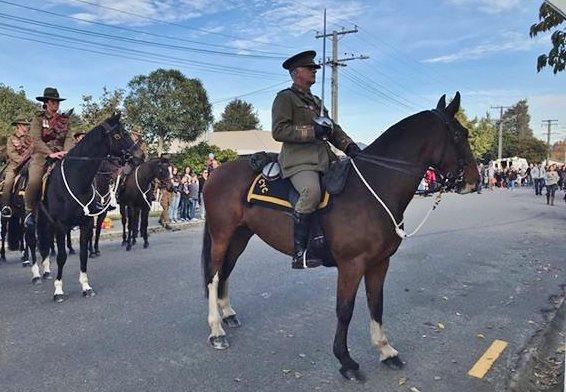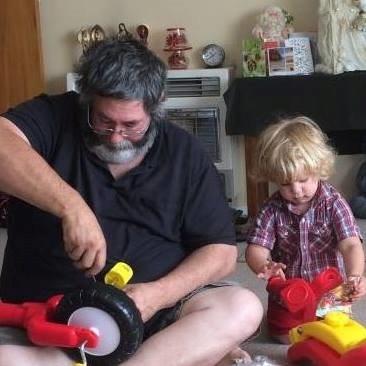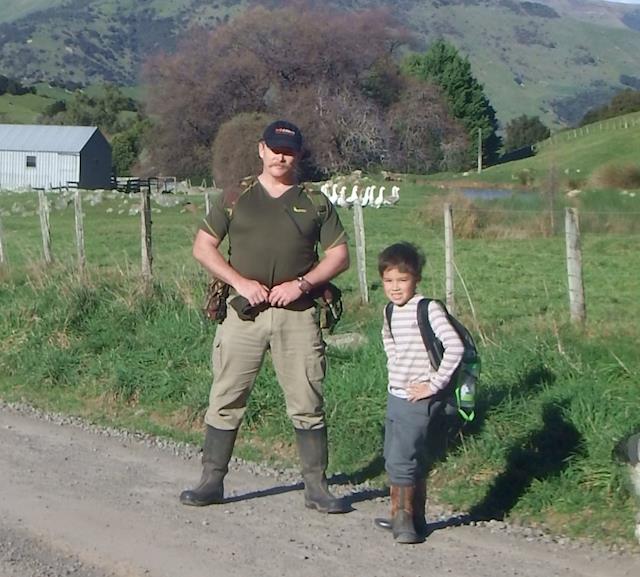The Long Road Home - walking for PTSI
-
-
Meet one of our Riders who assisted during the earthquakes in Kaikoura
14 August 2018My name is Anna Keehan, I am a rider and trustee of the New Zealand Mounted Rifles Charitable Trust (NZMRCT).
I am a 3rd generation local in the earthquake struck town of Kaikoura, now working as a security guard and an EMS officer for offenders on home detention. Prior to the earthquake I was working on high country stations as a shepherd.
After the 7.8 magnitude earthquake in 2016 I had to choose between staying in Kaikoura to help rebuild the lives of family and friends, or continue working in remote parts of New Zealand. My choice was to stay and help which I do not regret. This choice to pursue a different lifestyle in order to stay ended up putting me in some personal situations which now leave me dealing with PTSI.
I have been involved with the NZMRCT since 2015; I could never thank Mark Appleton, the fellow trustees and our members of NZMRCT enough for the support which they gave me when I was at my worst suffering with PTSI.
Raising money and awareness for those who suffer with PTSI is a cause which lies close to my own heart. I have a huge respect for my family and friends who have, and are, serving under the New Zealand and Australian flags. To be able to help raise money for soldiers who have, and are returning home from deployment with PTSI means that we can offer funds to those who may need them to get back on their feet again.
0 comments | Login to leave a comment -
Meet our medic, a member of the Little River Volunteer Fire Brigade
12 August 2018My name is Pam Baird.
I have been a resident of Little River on Banks Peninsula since 2007 and a member of the Little River Volunteer Fire Brigade from December of that year.
The Brigade has an important roll in the community as the emergency response team this includes fire fighting, attending motor vehicle accidents, medical events and a variety of other emergencies.
As an ambulance takes 40 minutes to arrive at a local emergency the brigade members have been trained in First Response and look after the event until further help arrives.
I am looking forward to ‘The Long Road Home’ walk in January 2019 and providing First Aid support for the group
0 comments | Login to leave a comment -
Meet our saddlehand who is a survivor of violence and abuse
8 August 2018Hello, I'm Taylor Archer.
I'm a saddlehand/groomer for the support team during our trip and will be taking photos for the group.
Life's not been easy for me. I've had a rough time with depression and anxiety. I was exposed to abuse to the point I thought it was okay to be hurt by another person. I thought getting thrown around the room, getting threatened with rape, getting shown ropes while being pushed into a suicidal attempt, being derided, having no emotions or feelings was what love is and what it should be.
A few years back I tried to overdose and was taken to the hospital. My Dad picked me up, took me back to his place and got me walking with a camera to get my head to calm a little. It's become a thing for me now.
Applying for jobs has always been a struggle. Every job I applied for would always end up being declined.
I had applied myself for 3 years straight with no luck what so ever and I was about to give up. I had tried for everything and anything, but then I saw someone looking for a cleaner.
I now clean malls 3 days a week. It has helped my depression and anxiety a lot. I now don't notice people looking at me and I don't care about the stigma as much as when I first started.
Although things have improved, the fears and pain are still there.
Still have my down days, still have nightmares of my childhood. Sleep can be difficult, being home alone can be hard, or going out by myself is still a bit difficult. But, slowly I'm getting better.
I've been practicing photography now for 3 or 4 years while I was unemployed. While I don't see beauty in myself, when I take photos I love to show people the beauty I can see in anything and everything.
And I would love to share that with the world.
0 comments | Login to leave a comment -
Meet one of our Riders who served in the Gulf War
8 August 2018Hi, my name is Mary and I joined the Women’s Royal Army corps in January 1983 at 18 years old.
Why did I join? I didn’t want to do a desk job or further education. I had always been interested in the military; my grandparents on both sides of our family had both served in the 1st and 2nd World Wars. My father lived in London during the 2nd World War and on completion of high school did his National Service.
As kids, my older brothers and I would put on Granddad's helmet and uniforms and run around the garden and old air raid shelter that was at Gran's property. Although I had been adopted this was still my family, I never knew any other. I was proud to follow them.
When I joined up, our place in any conflict would be at 3rd Escalon; in other words, the furthest away from any conflict. We wore skirts most of the time. Later because of my trade (driver/mechanic) this changed.
As the years passed, I was promoted and became a section commander. At 5 feet 1 and 43kgs I was a tough little bugger and damn good at my job. Moved around the UK, Ireland and then the First Gulf War.
To the average civilian the 1st Gulf War was by layman’s terms short and sweet with not many casualties compared to the Invasion of Iraq and then into Afghanistan, however, this was far from the truth.
For those front line troops which now included me as part of the replenishment of fuel team, we were to come across the Highway of Hell, Basrah Road our MSR.
The day before the allied forces had blown up the retreating Iraqi soldiers and machinery leaving an estimated death toll of 10,000 troops.
What I witnessed that day came back to bit me 10yrs after my return. I began to have nightmares, flashbacks day and night. I could smell the burning flesh, see the body parts of young soldiers, faces of the dead and the sound or dead bodies popping as if still alive in the heat of the desert. We could not drive through as it was blocked so waited for engineers to push mangled body parts and burning machinery to the side.
A week later on returning down the road, the bodies were still there. They had started to place the ones they could ID into body bags, limbs detaching as they were carried away, that smell haunts me - it never goes away.
Today I cope in whichever way I can. Sometimes it’s by hurting myself to remove the mental pain to physical pain for just a few minutes. I have no help from the Canterbury District Health Board: my complex issues are in the “TOO HARD BASKET” so I remain alive but wishing I was dead.
Had it not been for Mark Appleton and the rest of the NZMRCT troopers I wouldn’t be here today.
Please help us to make sure that those returning soldiers from recent deployments with PTSI have the funds for their care and understanding. And there are good people with lived experiences to help you, understand you and most of all listen to you.
0 comments | Login to leave a comment -
Meet the president of the NZMRCT
6 August 2018My name is Mark Appleton, President of the New Zealand Mounted Rifles Charitable Trust (NZMRCT) We are a registered charity [number CC52885].
Most of the troop have been with us from our beginnings and new additions come along all the time. We enjoy getting together whilst raising awareness of PTSI/D.
We DO NOT directly offer care in any shape or form, only the means to pay for it and the ability to raise awareness about it; we leave the specialised care to the experts.
We have contacts in the Military and civilian psychological departments, the RSA and No Duff. In the past when we have come across cases we have deferred to them.
The amounts of money that we raise are relatively small but the funds are held in Trust for anyone that needs them. We have donated to Rannerdale in the past contributing to their new Jacinda Baker Wing in memory of Jacinda who was tragically taken by an IED.
The Trust has attended many functions and A&P shows in the past including the Guard of Honour at the Featherstone Memorial Fund Raising Military Dinner, the reopening of the Christchurch RSA, opening the evening show at Equitana in Auckland, a funeral at the request of the Christchurch RSA, the Passchendaele remembrance service at the Bridge of Remembrance in Christchurch and Military days at the Ryman Healthcare Charles Upham Retirement village in Rangiora and still proves extremely popular wherever we appear.
In 2015, along with many others I took part in the 100 Horses event in Waikari, this was the catalyst for the New Zealand Mounted Rifles Charitable Trust. The Trust was set up when we realised that we had something the public were interested in, a way to remember the Mounted regiments of 100 years ago and a platform to raise awareness and money for the care of our veterans.
The Long Walk Home:
Bernie and Murray, the other two organisers, had come up with the idea of doing a walk from Wellington to Hanmer Springs to commemorate the coming home of the WW1 troops. This appealed to me so I put it to our troop. Before long we had 8 of our troopers committed to doing the walk (on horse back) . A meeting was set up and “The Long Walk Home” was born.
We the NZMRCT are honoured to support it and be a part of it. This will be the first of many walks, the first one aptly to commemorate the returning soldiers of WW1 and their struggles with PTSI / D.
Having the solid backing of the RNZRSA and WW100 we feel this could become an annual walk for many to take part in. Our intention is to make this an annual walk observed in different countries across the world, for all nationalities and sufferers of PTSI /D whether due to military service or brought on by other causes.
With our tag line “ you will not walk alone” it is our goal to support every sufferer of this debilitating injury, enabling them to get help from professional people who specialise in their treatment.
We have found that providing a platform for them to speak about their PTSI/D , and that of their loved ones, privately in some cases, seems to help them. Just the fact that they are no longer walking that road alone is enough to give them hope and to seek treatment.
We are approachable to any questions you may need to ask about our intentions and will be pleased to answer. We are an open and transparent group.
Join us @joinTLRHome on Facebook and please donate to our Give a little page https://givealittle.co.nz/cause/we-will-remember-them
Share this please
0 comments | Login to leave a comment -
Meet our logistical and support leader, Murray Hill
5 August 2018My name is Murray Hill. I was born a long time ago in Auckland instead of Dunedin because my father was in the Navy. He was in the navy because he was a rebel. All his uncles and father had been in the army from the time of the Boer War. Most were cavalrymen and almost all of them were wounded in either the First or Second World Wars.
In 1958 he joined HMNZS Pukaki on its return from observing a nuclear air burst as part of Operation Grapple. The ship also used water for cooling taken from down-wind of ground zero. We assume that the ship was still “hot” when it returned to New Zealand and he joined it.
Which was lucky, if you can call it that. Most of the ships crew did not live to be fifty, many of the wives had trouble conceiving or carrying to full term. I was in my thirties my doctor discovered I had been conceived as twin and I had absorbed the other as my twin had decided to start growing. The tiny lump was removed from the side of my nose.
One of the ongoing problems that are suspected to be a result of Operation Grapple is Asperger’s syndrome. My older brother has it so badly that he can’t actually see it. I have it, and my son has a milder version. He isn’t fast with speech but he is mechanically adept and he can read extremely well for a five-year-old.
In my case, I have always had a problem with anger. I stopped playing rugby because I found myself playing harder than was appropriate, particularly if I thought the other team were playing dirty. Eventually, I took up rowing where my aggression was channelled into non-contact physical exertion.
I joined the army because my father told me to. And possibly due to some romantic connection to our past we decided on the armoured corps.
This ended up with me being in 1 Scots (1st Squadron New Zealand Scottish) which was intensely involved in providing armoured mobility to the 2nd/1st Battalion. When a third company was raised our workload did not suddenly decrease. For each week that an Infantry company spent in the field, we spent two. If the entire battalion went into the field we could and did, spend up to six weeks in the field without a break.
On my first exercise, I got maybe twelve hours sleep in a week. We were driving from contact to contact, often with the .50 cal firing directly over my head. Within a year I was suffering from chronic insomnia and when I did sleep I dreamed of the muzzle flash and thumping of the .50.
I did not tell anyone and I didn’t feel there was anyone I could talk to and eventually, I asked for a transfer to the navy. I was granted a transfer because of who my father was and I completed my hydrographic training at the top of my class (three of us so don’t be too impressed). Then I was posted to HMNZS Monowai, where the wisk (whole ships coordinator) put me on one of the Oerlikon crews because they were short of gunners.
And the nightmares and insomnia began again. So, I requested a premature discharge. I didn’t actually want to leave but I didn’t feel I had any options.
I later moved back to Wellington and Joined 7WnHB RNZIR where I could get my dose of being in the army without having to live there. The nightmares made occasional reruns but have faded over time. Now I just have the Asperger’s to deal with which has already seen me fly two marriages into the mountain. I’ve also had three mini-strokes basically because food is comforting.
So obviously I don’t have as much time left as I would like to get my son ready for his great adventure and I’m doing this walk for Percy, Harry, Les and George Guyton, Robert Hill mk1 and Robert Hill mk2. And Bernie needs someone around to slap him with a map regularly.
0 comments | Login to leave a comment -
Meet one of our walkers and his story for proposing this initiative.
5 August 2018Hello everyone,
I'm Bernard Shapiro and I'm one of the walkers for this project.
I've been hit pretty hard by PTSI over the last six years thanks in part to a few things I witnessed while helping out during the relief of the Eastern Suburbs of Chch during the quakes.
I served in the RNZIR [TF] with the 7th Wellington Hawkes Bay Battalion, along with another one of our team members, Murray Hill, who was my section leader; he's still fond of slapping me over the head with a map occasionally and is in charge of our logistics, convoys and is 'camp mother' to us all.
Also known as 'Bad Santa'...
This project means a few things for me personally.
Not only am I taking it as an opportunity to get fit after years of sedentary lifestyle and to shed a few pounds, but it also matters enormously on a personal level.
My mother Eileen Salant was a War Correspondent in French IndoChina during the 1950s and again when it was called Vietnam in the 1960s. She saw more than she certainly needed to and it came back to haunt her in the 1980s.
She attempted suicide twice while I was in highschool but I managed to get to her and stop her bleeding each time. She was moved to Princess Margaret Hospitals C Ward for a time and I carried on, getting a part time job to pay the rates and bills while I went through School Cert.
She eventually retreated to the West Coast and died alone of cancer while I was in Australia in 1996 - never said a word.
Recently Christchurch has had a spike in suicides as the effects of the 12,000 earthquakes make themselves known in our population. It immediately put me in mind of my mother, so I set out to try and do something to help.
It did not take long to find people with real skills to make this possible and I am grateful to all of them.
As you can see, this subject is very close to many of us and I guarantee we are not going into it lightly, nor unaware of the conditions that people face today. We not only understand PTSI, we have enormous empathy for those who have it.
Those of us going with PTSI have survived the worst it can throw at us and we mean to be here for people who are currently going through hell.
If you believe in what we are doing, please go to our givealittle page and help us out; even if it's just for a dollar. You can help make a difference!
Your donations will be going to help make this walk publicly known and operable [on a tight shoe string with volunteers - just fuel and food for six days] and all excess will go to organisations who support those struggling with PTSI.
Thanks!!!!
0 comments | Login to leave a comment

